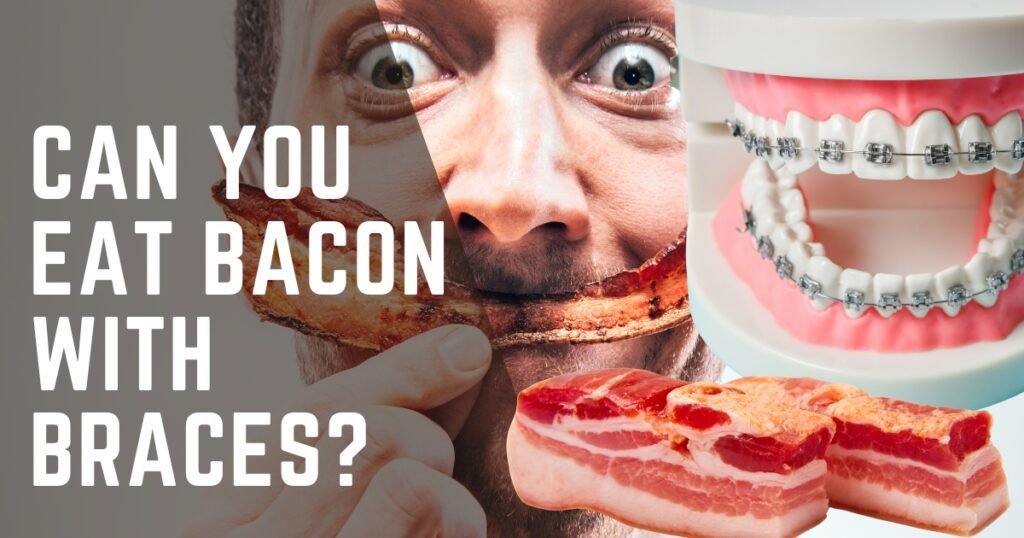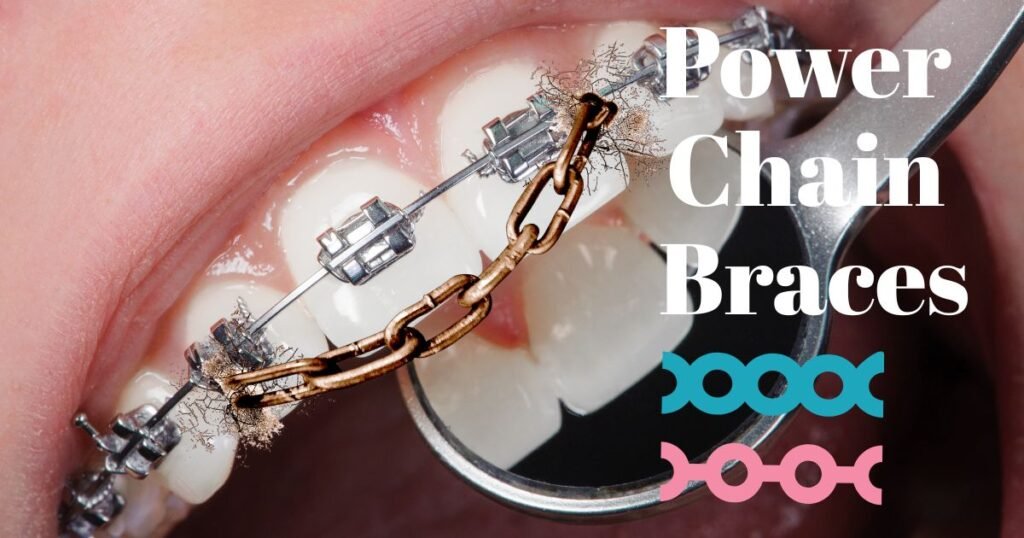A Crispy Misstep: A True Braces Story
Raj, a 12-year-old, looked forward to the family weekend breakfast tradition—crispy bacon, scrambled eggs, and toast. He has had no major issues with just a week of braces. As he bit into the first crispy slice of bacon, he suddenly felt a pop. The bracket snapped loose, and with that, his Saturday morning was no longer to be enjoyed, thanks in part to the orthodontist instead of the bacon.
Indeed, Raj’s story is more common than you would think. While braces can take pressure, certain foods can spell trouble if you don’t watch out. So, for the million-dollar question: Can you eat bacon with braces? Let’s break it down, walk through the facts, and truly find out what matters to know before reaching for that sizzling strip.
Is Your Favorite Bacon Safe with Braces? Use This Interactive tool.
Can You Eat This Bacon with Braces?
Understanding Braces and Food Restrictions
Before we get to bacon, in particular, let’s look at why your orthodontist has probably issued you with a list of foods entitled “do not eat.” Braces comprise brackets, wires, and bands delicately fixed onto your teeth. Hard, crunchy, or sticky foods can bend wires or dislodge brackets, setting your treatment back by weeks.
So, when asking Can you eat bacon with braces, you are really asking: Will bacon hurt my braces, hurt me, or make cleaning more difficult?
Here are the five facts you need to know.
1. Not All Bacon Is the Same
Talking about bacon, most will imagine crispy, crunchy strips. The bacon exists in types-mostly soft and when naughty, chewy and crispy, to bacon bits for salad. It matters what kind of bacon you eat.
Crispy bacon is definitely something not so great for people who have braces. It can be too hard and snap off the brackets or bend the wires. Bacon that is cooked and softer, but not yet crunchy, is generally safer.
Here’s a quick comparison:
| Type of Bacon | Safe with Braces? | Why or Why Not |
|---|---|---|
| Crispy bacon | No | Too hard, can break brackets or wires |
| Soft-cooked bacon | Yes (in moderation) | Easier to chew, less risk to hardware |
| Bacon bits (hard) | No | Tiny, hard pieces can lodge in braces |
| Turkey bacon (soft) | Yes | Often softer and less greasy |
So the answer to Can you eat bacon with braces depends on the texture. Avoid hard or overly crisp options and choose softer types.
2. Bacon Can Get Stuck in Your Bracers
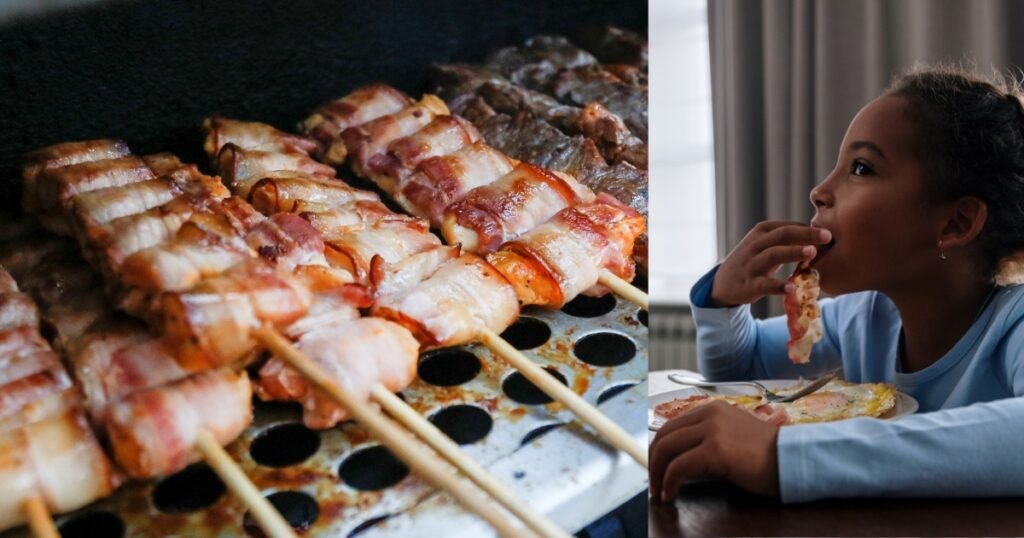
Even if you hold on to softer bacon, there’s yet another important issue-bacon can easily get trapped between brackets and wires. The greasy texture and tiny shredded pieces are just perfect to hide away in crevices.
What is wrong with this? The bacon will let fats and proteins turn into plaque if not removed properly. Bacteria will feed on those food particles left behind, worsening a situation where you can have gum disease and cavities.
The American Association of Orthodontists informs us that people with braces are twice as likely to have plaque buildup if they do not clean after every meal. If you do go for bacon with braces, make sure you wash and floss thoroughly.
3. The Risk of Damaging Braces Is Real
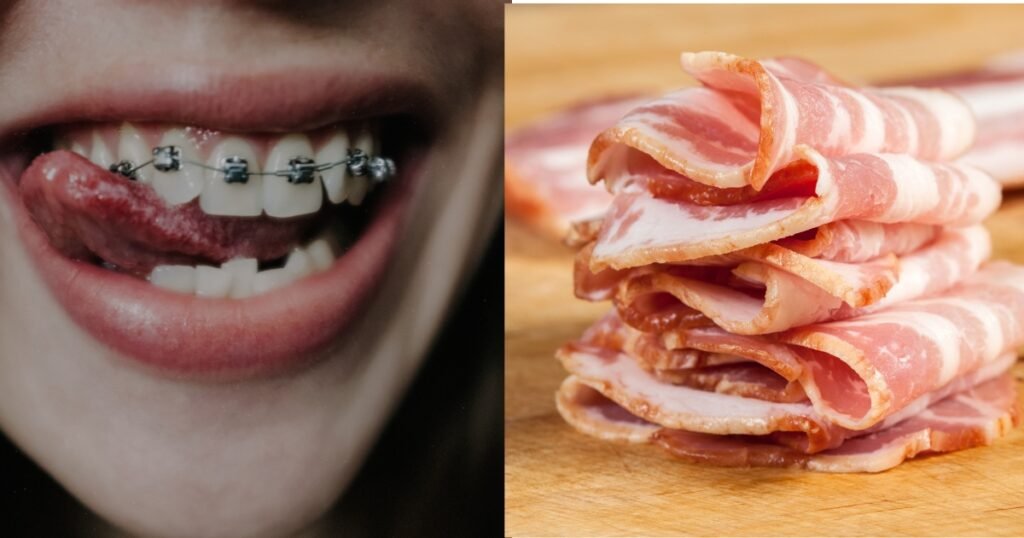
Orthodontists ensure that thousands of brackets are repaired each year owing to improper eating habits. A 2022 survey involving 500 orthodontic patients in the US found that 36 percent of patients experienced at least one broken bracket from eating hard or sticky foods. Bacon was not the number one culprit, but crispy bacon landed on the list.
Let it be clear: Eating bacon once or twice likely won’t cause instant damage, particularly if it’s soft. However, repeated hard-texture exposure increases your risk.
So, can you eat the bacon with braces regularly? If it is crispy and hard, definitely not. If you must, go for soft-cooked bacon, and chew slowly with your back teeth.
4. There Are Braces-Friendly Bacon Alternatives
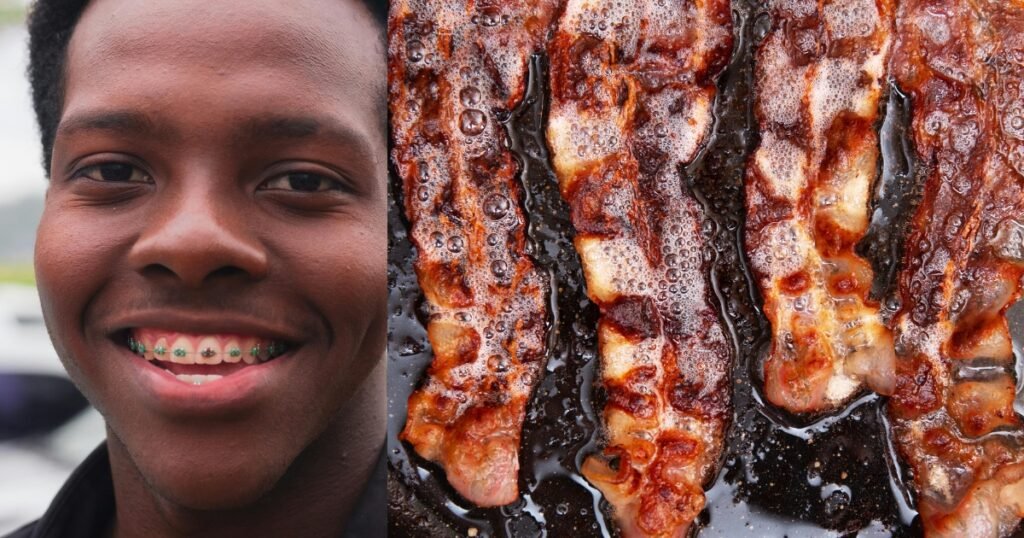
If you like the taste of bacon but you don’t want to keep risking your brackets, hey, there are several braces-friendly bacon alternatives that will satisfy your cravings without damaging your dental hardware.
These options include:
- Turkey bacon: Typically not so crispy and gentle on the braces.
- Plant-based bacon: Many such meatless varieties are softer and easier on the wings.
- Soft: Check these bacon bits. Some of them accept being chewed and are braces-safe.
- Bacon sauces: Can let you taste bacon without actually biting into it.
Once again, soft is the key word. The moment that bacon is crunchy, it will be a threat to your braces.
5. How You Eat Matters More Than What You Eat
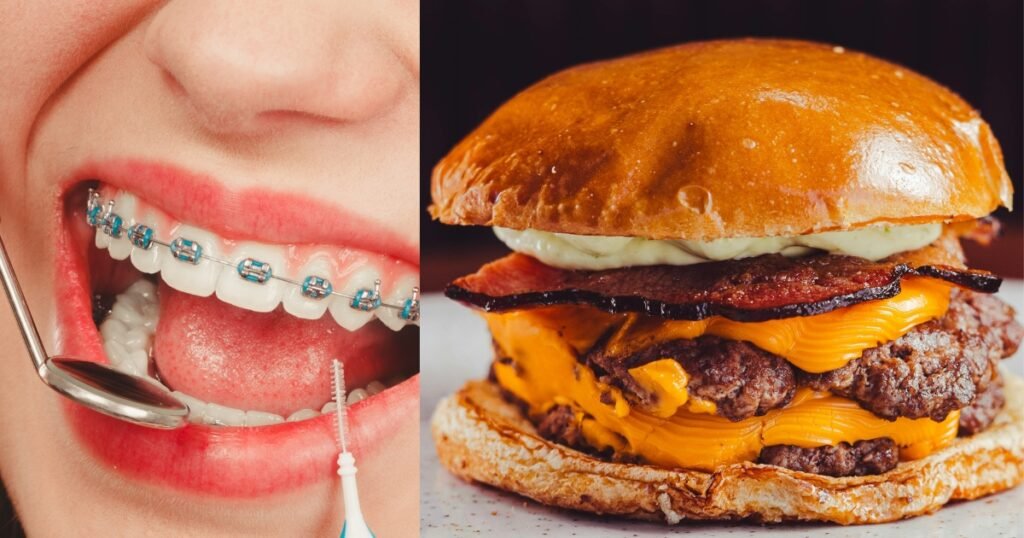
Believe it or not, the way you eat bacon is important today. Taking tiny bites, trying to chew slowly, or, basically, not biting with the front teeth may lessen the chance of damage.
Cutting up bacon into small portions for eating with back molars also helps reduce pressure on the brackets or wires. Then, having a post-bacon oral hygiene routine is always recommended: use a proxy brush or water flosser to remove those bits that are stuck between.
Hence, when people ask, Can you eat bacon with braces, maybe a smarter question can be: Can you eat bacon responsibly with braces?
How to Safely Eat Bacon With Braces
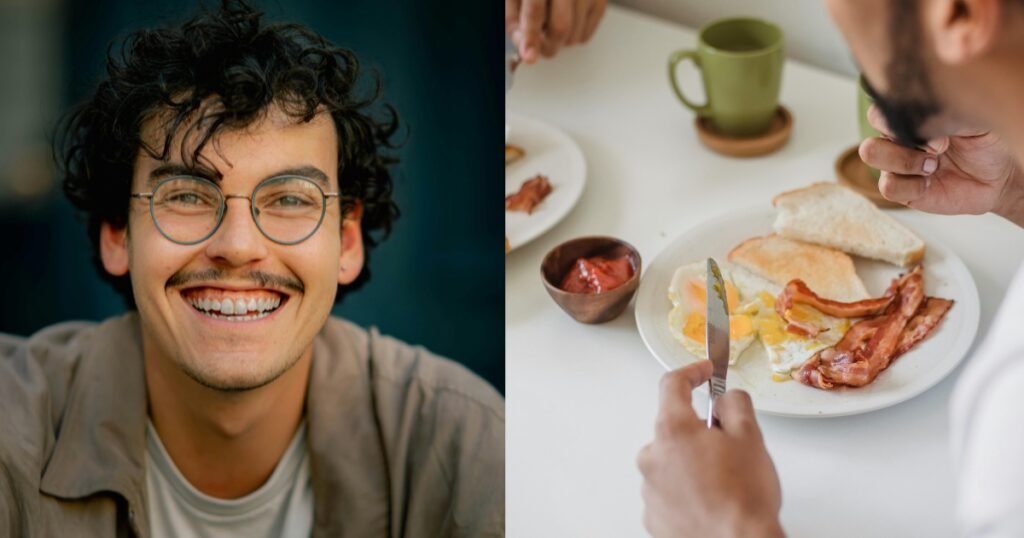
To make it super easy, here’s a checklist for those determined to enjoy bacon while wearing braces:
Do:
- Choose soft-cooked bacon
- Cut pieces of bacon into small bits
- Chew with the back teeth
- Brush and floss after eating
- Drink water to rinse grease away
Don’t:
- Eat crispy or hard bacon
- Bite the bacon with front teeth
- Skip cleaning after eating
- Ignore any pain on brackets or wires after eating bacon
These tips will be a great help to keep people on track with their orthodontic treatment.
Real Voices: What Braces Users Say
Let us hear from a couple of real people who have asked the same question: Can you eat bacon with braces?
Ayesha, 17, California:
“I didn’t eat bacon the first month after getting braces. Now I only eat it if it’s soft. I always clean really well after.”
Michael, 22, Florida:
“I like my bacon crispy; however, it just isn’t worth it. A wire once broke, and I had to wait three weeks for it to be fixed. Turkey bacon, I eat easily now.”
Ravi, 15, India:
“My mom boils bacon and pan-fries it gently to make it soft. I get the taste but none of the stress.”
These stories imply that while having bacon during braces is possible, it really is about being smart and cautious.
These stories show that while you can eat bacon with braces, it’s all about being smart and cautious.
What Orthodontists Recommend

Most orthodontists don’t outright forbid bacon, but they suggest checking on the dos and don’ts. Here are some generic rules from professionals:
Avoid crunchy bacon in particular in the first few months after getting your braces.
Use tender meats and foods not demand lots of chewing.
Go for foods that do not simply glue onto your hardware.
If in doubt at any time, just ask your orthodontist.
The Bottom Line: Yes, But Be Careful
So, can one have bacon with braces? Yes, one can-but it’s supposed to be soft and eaten with great care alongside good oral hygiene. No hard, crispy bacon as it will damage brackets and cause pain, which may also lead to a delay in treatment. When you embrace the associated risks and make wiser choices, you can enjoy your favorites without giving up on your smile.
Now that you know the reality, will you bite smart the next time you’re offered a piece of bacon?
FAQ 0n Can you eat bacon with braces
Can you eat bacon with braces if it’s soft?
After you get braces, you may eat soft bacon, though it should not be too hard or crispy. A soft-cooked bacon will not harm your braces components, and it allows for easier eating. Select soft bacon or gently fried types instead of crispy bacon. The process of cutting bacon into small bite-sized pieces is needed before you eat it. Use your back teeth to chew food and make sure you brush your teeth completely afterward.
What happens if I eat crispy bacon with braces?
Consuming crispy bacon when you have braces can result in both broken brackets and bent wires. Eating crispy bacon can create situations where food particles remain in areas that are difficult to clean, thereby promoting plaque buildup and cavity development. The pressure from crispy textures causes direct force on orthodontic hardware. The combination of pain along with loose wires and dental emergencies could be experienced by patients. You need to stick with eating soft foods while undergoing your treatment.
Are bacon bits safe to eat with braces?
People should avoid consuming bacon bits, which contain hard and crunchy pieces, because they pose dangers to those wearing braces. These pieces can become trapped in brackets, which creates the potential to harm your orthodontic braces. Crunchy bacon bits that come in packages should be avoided entirely. People who choose to eat bacon bits should make sure they are tender enough to chew easily. You can select bacon-flavored seasoning as a better choice for your diet.
Can I eat turkey bacon with braces?
Turkey bacon is considered safe for brace wearers who prepare it correctly because it has a softer texture and reduced fat content. The texture of turkey bacon becomes softer when it is gently pan-fried. This food is simpler to masticate and produces a decreased risk of harm. Make sure to assess the food’s texture before consumption and maintain regular cleaning procedures.
How can I safely enjoy bacon while wearing braces?
People who want to eat bacon with braces should select versions that are cooked to tenderness and avoid using their front teeth to bite while maintaining proper dental care habits post-meal. Cut bacon into bite-sized pieces whenever you eat it. Use your back teeth instead of your front teeth when chewing. After eating bacon, you should use mouthwash and then brush your teeth and finish with flossing to eliminate food particles and dental plaque.

Dr. Niraj Ghanghoriya is a passionate dental surgeon with over 12 years of experience in clinical dentistry. He completed his BDS from the prestigious Sri Aurobindo Institute of Dentistry in 2012 and specializes in painless root canals, smile makeovers, and preventive oral care. He is the Founder of ToothCareUSA.com and a registered Dental Surgeon (Reg No: A-03649) based in Indore. Known for his patient-first approach and clear communication, Dr. Ghanghoriya aims to make dental knowledge accessible to everyone. When he’s not in the clinic, he enjoys writing informative dental blogs to help people take better care of their oral health. He reviews every article on this site to ensure medical accuracy and patient safety.

